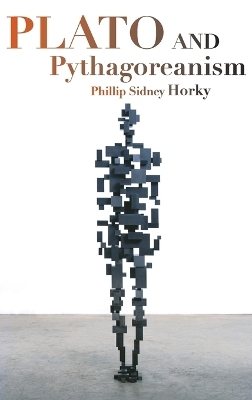
Plato and Pythagoreanism
Seiten
2013
Oxford University Press Inc (Verlag)
978-0-19-989822-0 (ISBN)
Oxford University Press Inc (Verlag)
978-0-19-989822-0 (ISBN)
Was Plato a Pythagorean? Plato's students and earliest critics thought so, but later scholars have been more skeptical. Plato and Pythagoreanism reconsiders this question by arguing that a specific type of Pythagorean philosophy, called "mathematical" Pythagoreanism, played a profound role in Plato's philosophy.
Was Plato a Pythagorean? Plato's students and earliest critics thought so, but scholars since the 19th century have been more skeptical. In Plato and Pythagoreanism, Phillip Sidney Horky argues that a specific type of Pythagorean philosophy, called "mathematical" Pythagoreanism, exercised a decisive influence on fundamental aspects of Plato's philosophy. The progenitor of mathematical Pythagoreanism was the infamous Pythagorean heretic and political revolutionary Hippasus of Metapontum, a student of Pythagoras who is credited with experiments in harmonics that led to innovations in mathematics. The innovations of Hippasus and other mathematical Pythagoreans, including Empedocles of Agrigentum, Epicharmus of Syracuse, Philolaus of Croton, and Archytas of Tarentum, presented philosophers like Plato with new approaches to science that sought to reconcile empirical knowledge with abstract mathematical theories. Plato and Pythagoreanism shows how mathematical Pythagoreanism established many of the fundamental philosophical questions Plato dealt with in his central dialogues, including Cratylus, Phaedo, Republic, Timaeus, and Philebus. In the process, it also illuminates the historical significance of the mathematical Pythagoreans, a group whose influence over the development of philosophical and scientific methods have been obscured since late antiquity. The picture that results is one in which Plato inherits mathematical Pythagorean method only to transform it into a powerful philosophical argument concerning the essential relationships between the cosmos and the human being.
Was Plato a Pythagorean? Plato's students and earliest critics thought so, but scholars since the 19th century have been more skeptical. In Plato and Pythagoreanism, Phillip Sidney Horky argues that a specific type of Pythagorean philosophy, called "mathematical" Pythagoreanism, exercised a decisive influence on fundamental aspects of Plato's philosophy. The progenitor of mathematical Pythagoreanism was the infamous Pythagorean heretic and political revolutionary Hippasus of Metapontum, a student of Pythagoras who is credited with experiments in harmonics that led to innovations in mathematics. The innovations of Hippasus and other mathematical Pythagoreans, including Empedocles of Agrigentum, Epicharmus of Syracuse, Philolaus of Croton, and Archytas of Tarentum, presented philosophers like Plato with new approaches to science that sought to reconcile empirical knowledge with abstract mathematical theories. Plato and Pythagoreanism shows how mathematical Pythagoreanism established many of the fundamental philosophical questions Plato dealt with in his central dialogues, including Cratylus, Phaedo, Republic, Timaeus, and Philebus. In the process, it also illuminates the historical significance of the mathematical Pythagoreans, a group whose influence over the development of philosophical and scientific methods have been obscured since late antiquity. The picture that results is one in which Plato inherits mathematical Pythagorean method only to transform it into a powerful philosophical argument concerning the essential relationships between the cosmos and the human being.
Phillip Sidney Horky is Lecturer in Classics at Durham University.
Contents ; Acknowledgements ; Abbreviations ; Preface ; Chapter 1: Aristotle on Mathematical Pythagoreanism in the 4th Century BCE ; Chapter 2: Hippasus of Metapontum and Mathematical Pythagoreanism ; Chapter 3: Exoterism and the History of Pythagorean Politics ; Chapter 4: Mathematical Pythagoreanism and Plato's Cratylus ; Chapter 5: What is Wisest? Mathematical Pythagoreanism and Plato's Phaedo ; Chapter 6: The Method of the Gods: Mathematical Pythagoreanism and Discovery ; Afterword ; Index Locorum ; Bibliography ; General Index
| Erscheint lt. Verlag | 19.9.2013 |
|---|---|
| Verlagsort | New York |
| Sprache | englisch |
| Maße | 236 x 163 mm |
| Gewicht | 584 g |
| Themenwelt | Geschichte ► Allgemeine Geschichte ► Vor- und Frühgeschichte |
| Geschichte ► Allgemeine Geschichte ► Altertum / Antike | |
| Geisteswissenschaften ► Philosophie ► Philosophie Altertum / Antike | |
| Mathematik / Informatik ► Mathematik | |
| Naturwissenschaften | |
| Sozialwissenschaften | |
| ISBN-10 | 0-19-989822-7 / 0199898227 |
| ISBN-13 | 978-0-19-989822-0 / 9780199898220 |
| Zustand | Neuware |
| Haben Sie eine Frage zum Produkt? |
Mehr entdecken
aus dem Bereich
aus dem Bereich
auf den Spuren der frühen Zivilisationen
Buch | Hardcover (2023)
C.H.Beck (Verlag)
20,00 €
Konzepte – Methoden – Theorien
Buch | Softcover (2024)
UTB (Verlag)
39,90 €
Was Pompeji über uns erzählt
Buch | Hardcover (2023)
Propyläen (Verlag)
32,00 €


